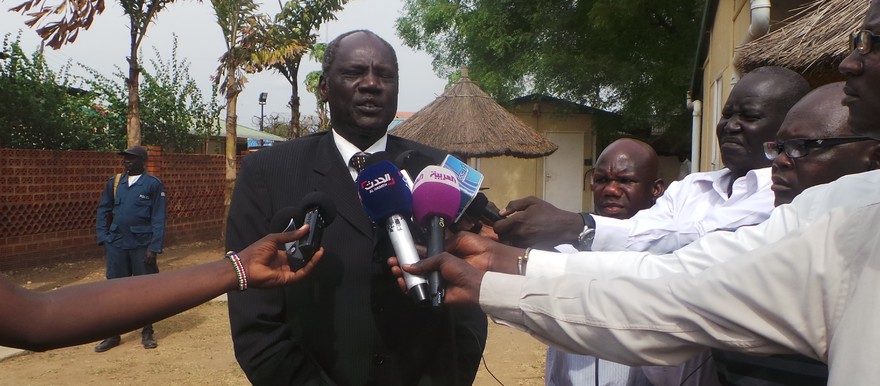South Sudan's government and its 'peace partner' SPLM-IO cannot agree on whether opposition troops will be allowed to assemble and garrison in the Equatoria and Bahr el Ghazal regions of the country, according to representatives of both sides.
Minister of Information Michael Makuei and SPLM-IO Chief Negotiator Taban Deng told press on Wednesday after a meeting of the Joint Monitoring and Evaluation Commission (JMEC) that the government wants SPLM-IO cantonment sites only in the Upper Nile region, which comprises the three states of Jonglei, Unity and Upper Nile.
SPLM-IO, on the other hand, says that groups of opposition fighters aligned to it or falling under it in the Equatoria states and Western Bahr el Ghazal should be given designated cantonment sites in accordance with the agreement.
The word 'cantonment' describes a site where military units are usually encamped for a long period of time. Chapter 2, Article 2 of South Sudan's peace agreement requires the “separation, assembly and cantonment of… forces previously in combat.”
SPLM-IO representative Taban Deng said, “We have suggested about five places in Equatoria and about four places in Greater Bahr el Ghazal. Government of South Sudan is refusing this. They are saying that… there are no opposition forces in Western Equatoria, in Eastern Equatoria, in Western Bahr el Ghazal, in Northern Bahr el Ghazal.”
“This is a problem now. And we could not resolve this because government is refusing this,” said Taban.
He was speaking after a meeting of the Joint Monitoring and Evaluation Commission (JMEC) on Wednesday. The government spokesperson, who also participated in the JMEC meeting, confirmed the disagreement over the cantonment sites in the two regions of Equatoria and Bahr el Ghazal.
“There was also the question of the cantonment areas, which was not agreed. The SPLM-IO believe that it has presence in Equatoria and Bahr el Ghazal, the government position is that these people are not included in the agreement, because the agreement says 'all those who were previously in combat' are the ones that will be affected by the agreement,” said Makuei.
“By 'previously in combat' means those who have been fighting before the signing,” said Makuei, who previously has referred to opposition forces in Western Equatoria as “bandits” and “criminals”, suggesting they are not protected by the ceasefire provisions of the peace agreement.
Neither the peace agreement nor the formal outcome document of a ceasefire workshop held in September 2015 specify that the SPLM-IO have cantonment sites in any part of Equatoria or Bahr el Ghazal. Chapter 2, Article 2.2 of the peace agreement specifies certain states where troops must be cantoned, plus any areas that shall be “declared” during a Ceasefire Arrangements workshop, which ended up taking place in September 2015.
“The warring parties agree that the forces that shall be cantoned shall be those forces previously in combat in Juba, Jonglei, Unity, and Upper Nile States, and any other forces related to the conflict in other areas that are declared by the warring Parties during the Permanent Ceasefire Arrangements Workshop,” says the peace agreement.
At the September 2015 workshop in Addis Ababa, known as the Permanent Ceasefire and Transitional Security Arrangements Workshop, the parties “provided lists of cantonment / assembly sites” to IGAD mediators, according to the signed minutes of the workshop, but the mediators never released to the public the list of declared cantonment sites.
The matter was later again discussed in meetings of the Joint Military Ceasefire Commission, including a proposal to revise the earlier list of cantonment sites. This suggests that a consensus on the matter was never reached.
Taban Deng said Wednesday, “JMEC must decide on it, otherwise… we propose that JMEC should task this to the IGAD heads of state so that they decide on it. I believe that people of South Sudan knows that there is fighting taking place in the whole of Equatoria and the whole of Bahr el Ghazal.”
Photo: Makuei Lueth




